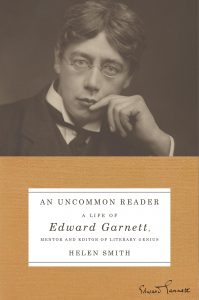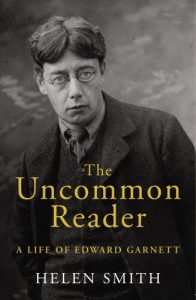Published by Jonathan Cape UK/ Farrar, Straus & Giroux US
2 November/ 12 December 2017
448pp, hardback, £30/ $35
Reviewed by Alison Burns
Edward Garnett, husband of Constance Garnett, who famously translated the great Russians into English, was for half a century an enormously influential figure in the English-speaking literary world. Editor, critic and, above all, publisher’s reader, he encouraged some of the leading authors of the late nineteenth and early twentieth centuries at early stages in their careers. Ford Madox Ford, Joseph Conrad, H.G. Wells, D.H. Lawrence, Henry James and Edward Thomas are just some of the most illustrious. Reading anywhere between 300 and 700 manuscripts a year, Garnett worked in turn for many of London’s finest publishing companies, including Heinemann, Duckworth, The Bodley Head and Jonathan Cape. There is scarcely anyone from Stephen Crane to Samuel Beckett whose writing life he did not touch.
It is curious, then, to find that this long, detailed biography, the fruit of ten years’ research into the documentary archive of this literary world, lacks excitement. If I were not a critic and publisher’s reader myself, would I have kept turning the pages, I asked myself.
Author Helen Smith gives an interesting insight (from his friend and lover, Nellie) into the downside for an editor/critic of the critical faculty so valuable to others: that one’s own creative activity becomes inhibited, as it is ‘exhausted in the service of others’. At its best, Smith’s account of Garnett’s life shows what drove him to work unceasingly not just with writers but fiercely on them: to make them do what he thought they were best at, regardless of the obstacles, and regardless of what the reading public may have thought it wanted. ‘The modern Englishman…does not want to be unsettled,’ he said, disparagingly, as he leapt enthusiastically and for life at signs of truth and originality. There is a very funny moment when he nails literary agents and their ‘magnificent air of favour’ when submitting tired material for the umpteenth time.
Garnett must have been quite a difficult man to live with. Neurasthenic, if not actually hypochondriac, he was happiest when surrounded by manuscripts and writers. The story goes that, at his regular lunches at the Mont Blanc restaurant, he would be reading the former while talking to the latter, and eating at the same time. One can understand this. He was living at a fascinating time, the transition between two centuries, when a reader’s choice could be between Galsworthy and Joyce, E.M. Forster and Henry Green, Stephen Crane and Jean Rhys. Who wouldn’t have wanted to be reading such writers at the start of their careers? It was a passion, but also an obsession.
So, perhaps, the fact of the matter is that Garnett’s own life was always going to be less interesting than the books he worked on. Helen Smith does her best with the material available, but leaves the impression often of tremendous detail about what is not tremendously significant. A shorter, sharper account might have made for a more engaging read.

